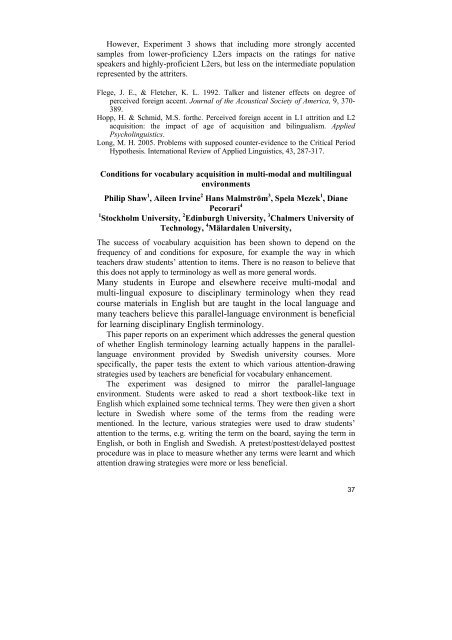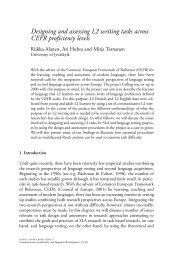BOOK OF ABSTRACTS - EUROSLA
BOOK OF ABSTRACTS - EUROSLA
BOOK OF ABSTRACTS - EUROSLA
You also want an ePaper? Increase the reach of your titles
YUMPU automatically turns print PDFs into web optimized ePapers that Google loves.
However, Experiment 3 shows that including more strongly accented<br />
samples from lower-proficiency L2ers impacts on the ratings for native<br />
speakers and highly-proficient L2ers, but less on the intermediate population<br />
represented by the attriters.<br />
Flege, J. E., & Fletcher, K. L. 1992. Talker and listener effects on degree of<br />
perceived foreign accent. Journal of the Acoustical Society of America, 9, 370-<br />
389.<br />
Hopp, H. & Schmid, M.S. forthc. Perceived foreign accent in L1 attrition and L2<br />
acquisition: the impact of age of acquisition and bilingualism. Applied<br />
Psycholinguistics.<br />
Long, M. H. 2005. Problems with supposed counter-evidence to the Critical Period<br />
Hypothesis. International Review of Applied Linguistics, 43, 287-317.<br />
Conditions for vocabulary acquisition in multi-modal and multilingual<br />
environments<br />
Philip Shaw 1 , Aileen Irvine 2 Hans Malmström 3 , Spela Mezek 1 , Diane<br />
Pecorari 4<br />
1 2 3<br />
Stockholm University, Edinburgh University, Chalmers University of<br />
Technology, 4 Mälardalen University,<br />
The success of vocabulary acquisition has been shown to depend on the<br />
frequency of and conditions for exposure, for example the way in which<br />
teachers draw students’ attention to items. There is no reason to believe that<br />
this does not apply to terminology as well as more general words.<br />
Many students in Europe and elsewhere receive multi-modal and<br />
multi-lingual exposure to disciplinary terminology when they read<br />
course materials in English but are taught in the local language and<br />
many teachers believe this parallel-language environment is beneficial<br />
for learning disciplinary English terminology.<br />
This paper reports on an experiment which addresses the general question<br />
of whether English terminology learning actually happens in the parallellanguage<br />
environment provided by Swedish university courses. More<br />
specifically, the paper tests the extent to which various attention-drawing<br />
strategies used by teachers are beneficial for vocabulary enhancement.<br />
The experiment was designed to mirror the parallel-language<br />
environment. Students were asked to read a short textbook-like text in<br />
English which explained some technical terms. They were then given a short<br />
lecture in Swedish where some of the terms from the reading were<br />
mentioned. In the lecture, various strategies were used to draw students’<br />
attention to the terms, e.g. writing the term on the board, saying the term in<br />
English, or both in English and Swedish. A pretest/posttest/delayed posttest<br />
procedure was in place to measure whether any terms were learnt and which<br />
attention drawing strategies were more or less beneficial.<br />
37



